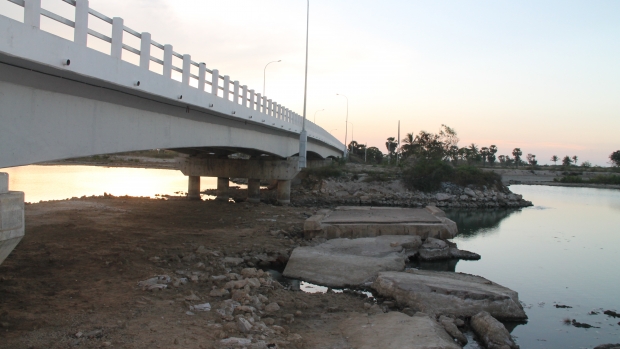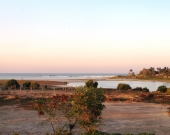Grants :: Small Grant Facilities :: Baseline analysis of Development opportunities for Thondamanaru Lagoon
Baseline analysis of Development opportunities for Thondamanaru Lagoon

Thondamanaru Lagoon , Thondamanaru Lagoon © Kumudini Ekaratne, IUCN, 2014
Objectives
Development options for Thondaimanaru lagoon is developed and presented to the authorities .
Background
The current situation of the Thondaimanaru lagoon is that there is no updated data on the fauna and flora of the Thondaimanaru lagoon (Northern Province or Sri Lanka).
But the overall picture of the ecosystem component and their interaction is needed as it is essential for the Conservation and Environmental education purpose. Here the environmental education purpose is very important because the school and University students of the particular region are not having good ecological field laboratory /destination. It needs not only enrich their knowledge but also contribute the Conservation strategic plan directly and indirectly.
The main causes for the problem were the 30 years lasting war, Due to the prevailed war there were high security tensions. The war has made two situations. One is security and due to that the field survey and field education was not feasible.
The groundwater in the Peninsula is already subjected to serious deterioration threats such as salinization and pollution due to anthropogenic activities.
As a part of the remedy of the above problem, a number of desalinization schemes have been implemented in the inland lagoons of the Jaffna Peninsula in the past to meet the fresh water needs of the Jaffna Peninsula. – Such as constructing barrages and bridges near the points where the sea water invades into the inland lagoons mainly at the Thondaimanaru lagoon region.
Second cause is the poverty and less livelihood opportunity due to the prevailed war situation, the internal displacement and land mines fear in the isolated area like lagoons. The sophisticated instruments such as binoculars’, field camera, mud sampler, environmental probes etc, were not allowed to use in the field during the war periods.
Now the 30 years lasting war is over the security risk also relaxed. The desalinization scheme within the Jaffna peninsula has been re-implemented and the barrages were reconstructed, under development schemes for the region. Now the Thondaimanaru barrage is functioning as expected.
Conversion of salt water lagoons into fresh water bodies may impose physical, chemical and biological changes in the surroundings of the inland lagoons, as well as in shallow groundwater environments and soils.
Therefore, it has to be monitored periodically to evaluate the environmental issues that may result in case of a successful outcome of desalinization of lagoons so it is an ideal time to start working. Numbers of families are being resettled close to the lagoon area and started their livelihood activities.
Also by doing this project it is able to contribute the livelihood as it is having funds for community livelihood activities. So through that the poverty issue can be addressed.
Main activities
- Compile available data on fauna and flora, hydrology, socio-economic status (literature survey.
- Fortnightly sampling from June 2014 to Dec 2014 at 20 locations within the study sites.
- Water samples will be assessed for EC, temperature, pH, DO, ORP, TDS (total dissolved solids), salinity, concentration of Cl-, HCO3- (bicarbonates).
- Assessment of fauna and flora
- Meetings with the lagoon dependent communities to obtain the current socio-economic status
- Awareness programmes to introduce the value of the Thondaimanaru Lagoon ecosystem and the conservation strategy to University students, school children, general public and government security forces around the lagoon.
Target beneficiaries
Academics, university students, school children, policy planners, general public (including the community surrounding the lagoon), nature tourists (mainly bird watchers) and tour guides
Outputs
-
Data base on fauna and flora hydrological and socioeconomics
-
Management plan for the Thondaimanaru lagoon
-
five documentary films
-
Field guide titled Guide to the Thondaimanaru Lagoon
Accomplishments and challenges
1. Data base on fauna, flora, hydrological and socioeconomic information of the Thondamanaru Lagoon.
2. A field guide to Thondamanaru Lagoon.
3. Documentary film on the Thondamanaru Lagoon.
4. 30 trained as Tour Guides.
Contributions to cross-cutting themes
The climate change is being addressed by measuring the lagoon water level and by observing the climate change indicator in the species. The Gender equity assured when conducting work shops and field works. Communication is achieved through production of booklets in all three languages and documentary films.
Lessons Learned
- The Grantee had gained lots of experiences from this project. Especially on how to identify the current problem of the ecological system, based on the problem to develop objectives and based on the objectives to draft the Logical frame with sets of activities in respective of time frame. Also realized the importance of the activity based budget. It helped a lot to allocate the money in appropriate activities. Also experienced with quarterly report format and the monthly finance report submission. It has given an idea for them to keep a tab on the progress.
Related News
Investigating the impacts of infrastructure on ecology and coastal livelihoods
Jaffna, Sri Lanka 24 Sep 2015
Country: Sri Lanka
Topic: Knowledge for Management
Scientists from Jaffna University in Sri Lanka have undertaken a small grant project whose impacts are widespread and long-term. The results of their research have given new life to an important lagoon in the northern part of the country, enhancing b...
Revitalizing Thondamanaru lagoon in Sri Lanka
Thondamanaru, Sri Lanka 23 Jun 2015
Country: Sri Lanka
Topic: Strategies for Management
Based on the results of a MFF small grant project, land use planners and provincial authorities in the Jaffna region, northern Sri Lanka are exploring new options for developing the environment around Thondamanaru Lagoon.
Project Facts
Country
Location
Thondamanaru Lagoon
Topic
Duration
1st Jul 2014 to 30th Jun 2015
MFF Grant Amount
LKR 2,897,950
Co-financing Partner
- Field Ornithology Group of Sri Lanka (FOGSL) (LKR 180,000)
- Community (LKR 50,000)
- Provincial Department of Education, Northern Province of Sri Lanka (In-kind)
- Zoological Students Association, University of Jaffna (in-kind)

